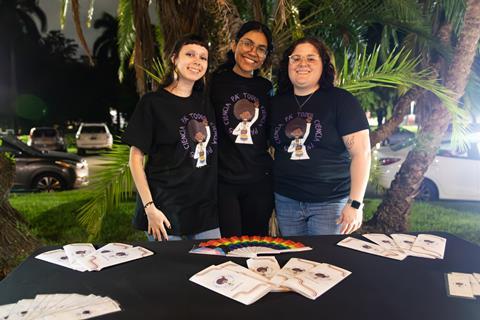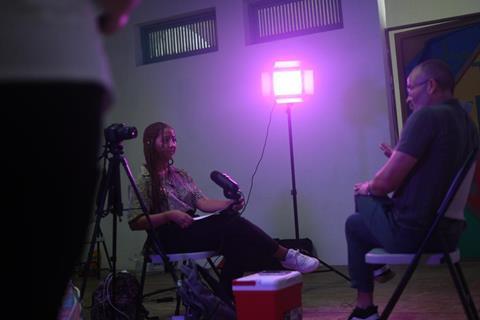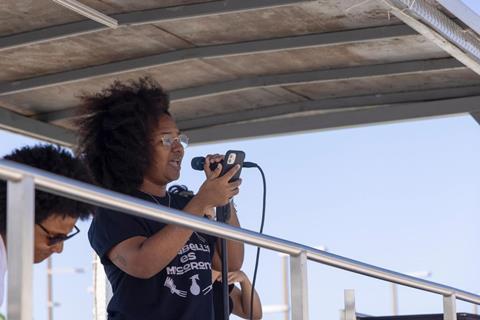In 2020, Puerto Rico faced a misinformation crisis. Melanie Ortiz Alvarez De La Campa reveals how five STEM undergraduates created a sci-comm organization that helped pass legislation, educated thousands, and created an inclusive database of Caribbean scientists.
In 2020, as the COVID-19 pandemic swept across the globe, Puerto Rico faced a second crisis: misinformation. Social media platforms were flooded with anti-science, anti-Asian and anti-black rhetoric, from conspiracy theories about the virus to distrust in public health guidelines. There was also a racially-charged uproar against the Black Lives Matter movement.

Scientific information was scattered, overly technical, and rarely available in Spanish. Even when it was, it often sounded stiff, cold, and disconnected from our daily lives. As five STEM undergraduates in Puerto Rico, we watched this unfold and decided to act. We created Ciencia Pa’ Todes (CPT), a Caribbean sci-comm organization that five years later has helped pass legislation in Puerto Rico, educated thousands online, and created an inclusive database of Caribbean scientists.
Growing up in our community, we had seen firsthand the inaccessibility of research if you had no formal training. From a young age, we were tasked with being translators at the doctor, or explaining public health guidance to our grandparents. Most of us were also people of color, and had experienced or witnessed racism in our community. We were often the only black, queer, and/or poor people in our college classes. The lack of representation felt isolating.
This feeling was exacerbated after the BLM protests during the COVID lockdown, which were met with harsh attacks on our communities on and offline. Therefore, our first goal with CPT was simple: to make science accessible and culturally relevant for Puerto Rican communities, starting with social media. We began by translating essential COVID-19 updates, breaking down vaccine myths, and creating posts that advocated for policies to protect minorities in STEM. Out of necessity, we spoke in the language of our people: using colloquial Spanish, slang, memes, and humor, all while staying grounded in evidence.
Faced with friction
We faced some friction at first. People would leave explicit or obscene comments, argue that our name was “fake” Spanish or that we were not real scientists, just “snowflakes”. We expected this response. We had already seen how other scientific sources were being attacked and ridiculed at the time. Yet, we were surprised to see that those mean comments were the minority. Most of the engagement was supportive, or people thanking us for sharing factual information concisely. We were invigorated by this response and decided to continue.
One of our early milestones was hosting a live panel with linguistics professors to discuss Spanish inclusive language in academia, a conversation that resonated deeply in a Latin American society where gender and language norms are constantly evolving. What we expected to be a small conversation actually hosted more than 100 people. From there, our scope widened. We began tackling topics beyond COVID-19: climate change, reproductive justice, HIV prevention, the science behind abortion access, and policy developments in Puerto Rico that involved both science and justice.
Growing beyond Instagram
Slowly, the CPT community grew beyond Instagram. We expanded to TikTok and YouTube, and we began appearing at in-person events. That was when we made a pivotal decision: we wanted to produce a film. With support from Amnesty International and Círculo Violeta, we produced what, to our knowledge, is the first-ever docuseries on intersexuality filmed in Puerto Rico.

The series highlighted intersex experiences on the island, discussed the biological implications and helped bring visibility to a community often ignored by both media and science. We worked alongside intersex creators to craft a scientific narrative that was important and representative for them. The impact was evident: over 10K views on Instagram, and doctors started using our documentary in the classes at the medical school campus in PR.
Collective power
We saw the collective power that including marginalized communities has on the quality and impact of scientific training. For that reason, we shifted our mission to formalize an educational community that is accessible to scientists and non-scientists alike. We now aim to promote the decolonization of science through alternative knowledge, and propose inclusive and intersectional solutions that take into consideration race, gender, sexuality, and disability, among others.
In 2024, with financial support from the María Fund, we were able to grow our team, improve our production, and amplify our reach. We created 65 pieces of educational content in 2024 alone, reached over 77,000 accounts in just three months, and launched our own website: cienciapatodes.org.
The website houses CPT Conecta, a groundbreaking database of Caribbean scientists committed to inclusive, accessible science. It already includes 50+ scientists across disciplines and identities, representing Black, Indigenous, disabled, nonbinary, and queer scientists who have long been left out of the spotlight. Students that access our database can see what projects each researcher is working on, if they are hiring and what are their core identities and values they chose to share. This helps students not just find research opportunities, but also to see themselves reflected in the academic community.
On-the-ground movements
Our collective has also joined on-the-ground movements, like advocating for Bill 1282 in Puerto Rico’s Congress to ban discrimination based on afro and curly hair textures and racial-ethnic hairstyles. We gave a speech at the Capitol’s steps, marched, and made sure our community helped to amplify this important cause. The legislation was later signed into law.

Today, we are a collective of 10 volunteer researchers with thousands of followers across platforms and a mission that continues to evolve. We have shown that science communication doesn’t need to be sanitized or stripped of culture to be rigorous. In fact, it becomes more powerful when it is rooted in the voices, humor, and realities of the people it’s meant to serve. Ciencia Pa’ Todes started as a response to misinformation and systemic racism, but it has grown into a movement for culturally grounded, justice-oriented science communication. We didn’t just want Caribbean people to trust in science; we wanted them to see themselves in it.
Melanie Ortiz Alvarez De La Campa is a Ph.D. candidate at Brown University. They are also the cofounder of Ciencia Pa’ Todes, a Caribbean science communication initiative.
Topics
- Amnesty International
- Applied Microbiology International
- Ciencia Pa’ Todes
- Círculo Violeta
- Climate Action
- Community
- COVID-19
- CPT Conecta
- Diversity & Inclusion
- Economic Equality
- HIV
- María Fund
- misinformation
- One Health
- Policy
- Public Health
- SARS-CoV-2
- Science Communications
- Science Education & Outreach
- The Americas
- USA & Canada







No comments yet